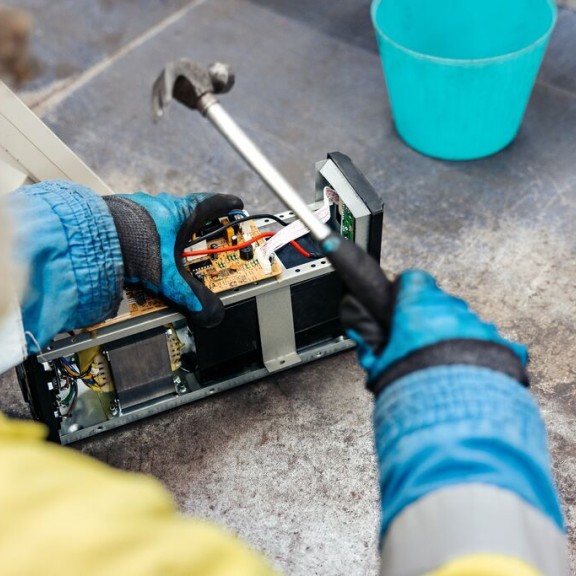
At the city's oldest social enterprise, people and materials get a second chance
The story of Milieuwerk began in 1992, with the aim of giving people from Amsterdam’s Spaarndammerbuurt a fair chance at meaningful work. Electrical appliances from across the city were collected and sorted at Milieuwerk, just outside Amsterdam. Today, the company is located in the Port of Amsterdam and employs 120 people who, as David Jansen (41), Director of Milieuwerk and the Recycling Service Centre (RSC), puts it: “struggle to find or keep a job on their own.”
Do what you love
Every day, David bikes from his home in the Houthavens to Kopraweg in the Port of Amsterdam, where his company is located. With great enthusiasm, he talks about his work and the energy he gets from helping people. Around 50 people work on-site each day at Milieuwerk’s Recycling Service Centre (RSC), where the core value is: “Do what you love, and the rest will follow.”
A sense of belonging
Milieuwerk is the oldest social enterprise in the city and employs people with vulnerable positions in the labor market. Each employee is guided by a job coach, and the work is tailored to individual abilities. David explains: “That’s a skill in itself. How do you get someone off the couch and into a job? But in the end, everyone just wants to belong. No one wants to be dependent on welfare.” The focus is on what people can do. “That often means adjusting the pace or complexity of the work. Repetitive tasks help as well—suitable work, every single day.”
Circular activities
The RSC is a circular company that handles destruction batches, discarded textiles, and e-waste. “It’s really a social sorting center,” says David. “Through social employment, we extract maximum value from residual flows. These arrive unsorted and leave the RSC as sorted single streams, ready for final processing. Each year, we process 7,500 tons of unsorted e-waste into recyclable material streams and clean 6,000 tons of clothing to prepare it for fine-sorting and reuse. We’re active in re-use, refurbishment, and urban mining.”
Challenges
Running a circular business comes with its challenges. “Real estate in Amsterdam is expensive, and linear business models are simply cheaper than circular ones. On top of that, we, as consumers, say we want less—less CO₂, less consumption. But in reality, we’re consuming and throwing away more than ever,” David points out.
Looking ahead
In ten years, the RSC wants to be a thought leader at the intersection of the social and circular economy. Together with partners, it designs and develops circular solutions for processing materials and residual streams in socially inclusive ways. The vision includes 200 employees, all of whom face barriers to the regular labor market. Key partners include PreZero, WEEE Nederland, HVC, the Municipality of Amsterdam, Q-Plastics, HKS Metal, AEB, and Port of Amsterdam.
David: “We’re always looking for new partners to help make our dream a reality. In ten years, the entire warehouse will be in use, and the companies we want to work with will know exactly who we are and what we do. That’s what we’re working hard toward in the coming years!”